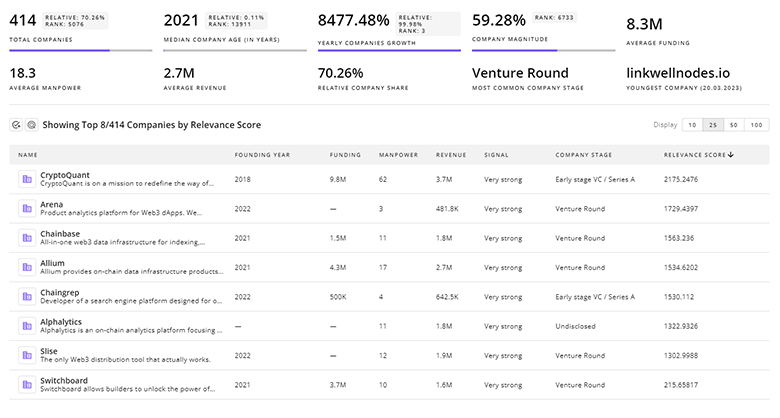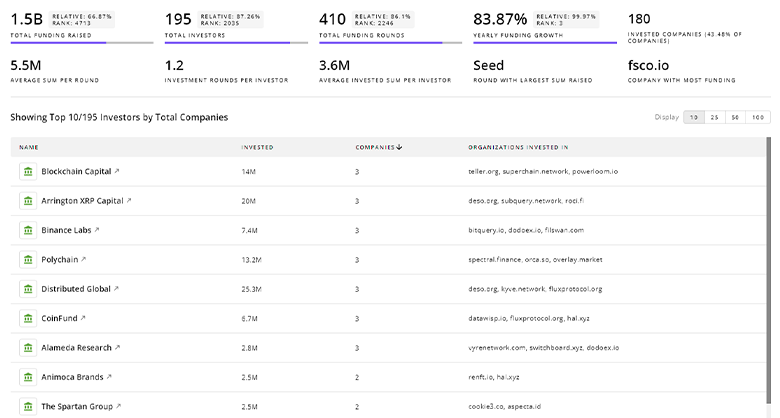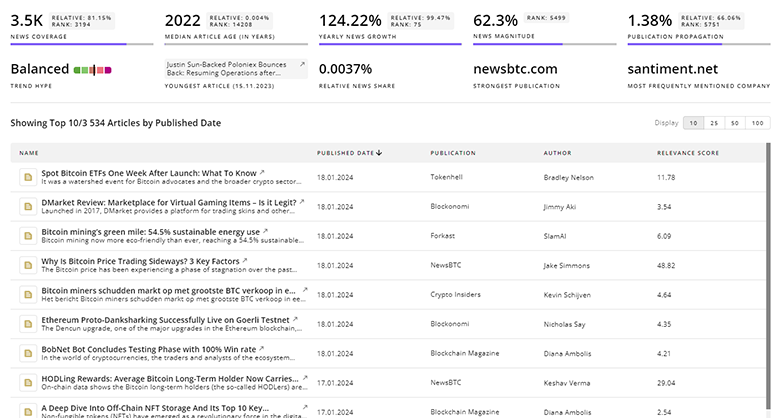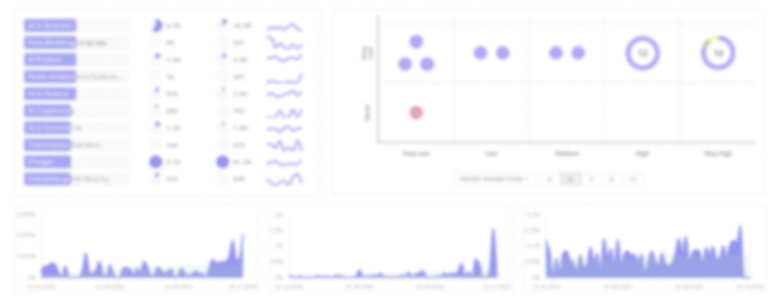
Private Cloud Computing Report
: Analysis on the Market, Trends, and TechnologiesThe private cloud computing topic experienced a 150.04% growth in the number of companies over the past five years, reflecting an expanding ecosystem seeking dedicated, single-tenant solutions. This surge coincides with a projected increase in global virtual private cloud market size from $28.74 billion in 2023 to $65.0 billion by 2032 at a 9.49% CAGR (Virtual Private Cloud Market Overview). Driven by demands for enhanced data privacy, predictable costs, and support for advanced workloads like AI and big data analytics, private cloud platforms are solidifying their role in hybrid and multi-cloud strategies.
The last time we updated this report was 69 days ago. If there’s something missing or off, your tips are welcome!
Topic Dominance Index of Private Cloud Computing
The Dominance Index for Private Cloud Computing merges timelines of published articles, newly founded companies, and global search data to provide a comprehensive perspective into the topic.
Key Activities and Applications
- Automated provisioning and rapid system establishment, reducing deployment time for private cloud environments.
- Data isolation and in-memory protection using isolated cell architectures to safeguard sensitive workloads.
- Seamless hybrid integration between private and public clouds through controlled information exchange systems.
- Container-based deployment for modular service orchestration and scalability, enabling quick updates without service interruption.
- Integrated disaster recovery and backup-as-a-service offerings that deliver near-zero RPO and RTO through offsite replication and hot-standby failover.
Emergent Trends and Core Insights
- Accelerated market expansion with a 26.71% CAGR forecast between 2023 and 2028, driven by demand for secure, compliant private cloud services (Private Cloud Services Market Trend | CAGR of 26.71%).
- Rising adoption of AI and ML workloads in private clouds, as enterprises seek controlled environments for sensitive model training and inference (7 Private Cloud Trends to Watch in 2025 – InformationWeek).
- Increasing emphasis on hybrid and multi-cloud architectures to balance on-premises control with public cloud agility, illustrated by patented data interaction methods.
- Growth of edge computing integrations to meet low-latency requirements for AR/VR and IoT applications, through portable on-site cloud nodes.
- Stringent data sovereignty and compliance demands prompting region-specific private cloud deployments and local data residency controls (A data sovereignty primer for cloud admins).
Technologies and Methodologies
- Virtualization and hypervisor-driven resource management, underpinning secure, multi-tenant isolation in private clouds.
- Container orchestration with Kubernetes to enable scalable, declarative workload deployment across private cloud clusters.
- Software-defined networking and automated infrastructure provisioning for dynamic network segmentation and policy enforcement.
- AI-driven workload placement and resource optimization to maximize performance and cost efficiency in data centers.
- Confidential computing using hardware-based enclaves and 3D encryption to secure data in use, beyond standard at-rest and in-transit protections (enclaive).
Private Cloud Computing Funding
A total of 286 Private Cloud Computing companies have received funding.
Overall, Private Cloud Computing companies have raised $22.9B.
Companies within the Private Cloud Computing domain have secured capital from 1.0K funding rounds.
The chart shows the funding trendline of Private Cloud Computing companies over the last 5 years
Private Cloud Computing Companies
- Zetacloud LLC helps businesses deploy and manage fully owned private and hybrid cloud infrastructures, achieving over 67% lower TCO compared to public hyperscalers through tailored hardware and platform optimization.
- Thunder Compute specializes in GPU-accelerated private clouds for AI/ML developers, boosting GPU utilization above 90% to cut idle resource costs by up to 5×, with a free trial credit model to lower adoption barriers.
- CloudCAN Technology Pvt Ltd delivers portable edge cloud devices featuring 20 TB storage and 100-core processing, enabling sub-nanosecond latency for on-site gaming, AR/VR, and AI applications in 5G environments.
- xongl cloud provides a NoOps private cloud platform for Indian SMBs, eliminating cost, compliance, and operational hurdles with SSD-backed servers deployable in under 60 seconds via an hourly billing model.
Delve into the corporate landscape of Private Cloud Computing with TrendFeedr’s Companies tool

3.6K Private Cloud Computing Companies
Discover Private Cloud Computing Companies, their Funding, Manpower, Revenues, Stages, and much more
Private Cloud Computing Investors
TrendFeedr’s Investors tool provides insights into 1.1K Private Cloud Computing investors for you to keep ahead of the curve. This resource is critical for analyzing investment activities, funding trends, and market potential within the Private Cloud Computing industry.

1.1K Private Cloud Computing Investors
Discover Private Cloud Computing Investors, Funding Rounds, Invested Amounts, and Funding Growth
Private Cloud Computing News
TrendFeedr’s News feature offers you access to 8.1K articles on Private Cloud Computing. Stay informed about the latest trends, technologies, and market shifts to enhance your strategic planning and decision-making.

8.1K Private Cloud Computing News Articles
Discover Latest Private Cloud Computing Articles, News Magnitude, Publication Propagation, Yearly Growth, and Strongest Publications
Executive Summary
Private cloud computing is undergoing a phase of rapid specialization and integration, driven by the need for secure, compliant, and cost-predictable environments. Simplified deployment, advanced security measures, and hybrid-edge integrations are now core capabilities, while AI acceleration and confidential computing address emerging workload demands. Startups are differentiating through TCO reductions, GPU-optimized platforms, and portable edge solutions, challenging traditional providers. As regulatory pressures and data sovereignty concerns intensify, organizations must assess whether to partner with broad-scope platform leaders or niche innovators that deliver mission-critical, specialized services.
Are you an insider in the trends or tech industry? We’d love for you to contribute to our content.










